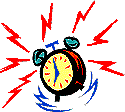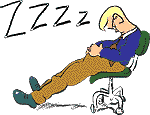 |
Losing
Sleep (Sleep Deprivation in the US) |
 |
 |
Losing
Sleep (Sleep Deprivation in the US) |
 |
 By Ellen Kuwana
By Ellen KuwanaNeuroscience for Kids Staff Writer Beep! Beep! Beep! Your hand reaches out and swats the clock. Can it be time to get up already? You groan and open one eye. Yep, it's time to get up. Your whole body argues. Just five more minutes in the warm bed...You push the snooze button and snuggle back in bed for a few precious minutes. Ah, more sleep. Your body relaxes, until...Beep! Beep! Beep! Are Most Americans Sleep-deprived?"Yes!" That's what a 2004 poll by the National Sleep Foundation says. We work too hard, stay out too late, and try to get too much done in a day. We are going to sleep later, getting up earlier. Anyone can do the math: we are sleeping fewer hours per night. The average adult sleeps 6 hours and 58 minutes per night during the workweek, according to the National Sleep Foundation poll. Sleep experts recommend 8 hours of sleep per night.
|

Why Are Students So Tired?Perhaps students are tired because they:
Whatever the reason, many children are not getting enough sleep. Teenagers may be especially tired. According to Dr. Mary Carskadon, pediatric council chair for the Sleep Foundation, teenagers need about nine hours of sleep, but because of biological changes associated with puberty, teens' sleep-wake clock may not signal that it's time for sleep until 11:00 pm or later. This may translate into teens not getting enough sleep. |
| Dr. William Dement (1928-2020) who was the head of the Sleep Disorders Center at Stanford University in California, warned that lack of sleep can cause serious consequences such as inability to focus on tasks, impaired memory, and irritability. | "Sleep deprivation is the most common brain impairment." -- Dr. William C. Dement, in The Promise of Sleep, 1999 |

How Can You Get a Good Night's Sleep?Experts suggest:
Didn't know any of this? You're not alone: the survey showed that 83% of the adult public failed the sleep IQ test!
Less Sleep?Not only are students sleeping fewer hours, they may also be sleeping less well. Why? Stress! What do kids have to be stressed about, you say? Plenty, research shows. A Seattle Times newspaper article (Tuesday, March 30, 1999, Lifestyle section, pages D1, D3) reported that kids worry about doing well in school, their family's health and well-being, and peer pressure--in that order. This worrying can cause children to have nightmares or trouble sleeping (called insomnia).To make the problem worse, most parents are not aware that their children are feeling stressed. Many students feel alone, think that their parents do not listen to them, and fear that they will be criticized for their fears. Is this generation unique in its fears? Probably not, but they do seem to worry about things at a younger age than previous generations. And they may not be armed with coping skills to deal with all their worries.
|
Wakefulness Drugs?Caffeine, of course, is one of the oldest drugs used for alertness. Some students buy pills with caffeine to stay awake for their studies. These short-term solutions can work, but may have side effects such as jitteriness, irritability, and a "crash" of sleepiness and lethargy when the chemicals wear off. One must weigh whether the side effects are worth the temporary gain of wakefulness and alertness. Next time, plan ahead and work on the paper or report before the last minute!
Unlike drugs such as amphetamines, Provigil does not seem to be addictive and it has relatively few side effects. And it does not cause a "rebound" of sleepiness after it wears off. Exactly how Provigil works is not yet clear. It probably acts on the brain's biological clock, causing the clock to "reset," and thus delaying sleep.
|
|
The brain does a lot for us--why not give it the break it deserves (and
maybe needs). Now get off the web, go do your homework, and GET TO BED! |
|
For more about sleep and sleep deprivation, see: |
| BACK TO: | Neuroscience In The News | Table of Contents |
![[email]](./gif/menue.gif) Send E-mail |
 Get Newsletter |
 Search Pages |